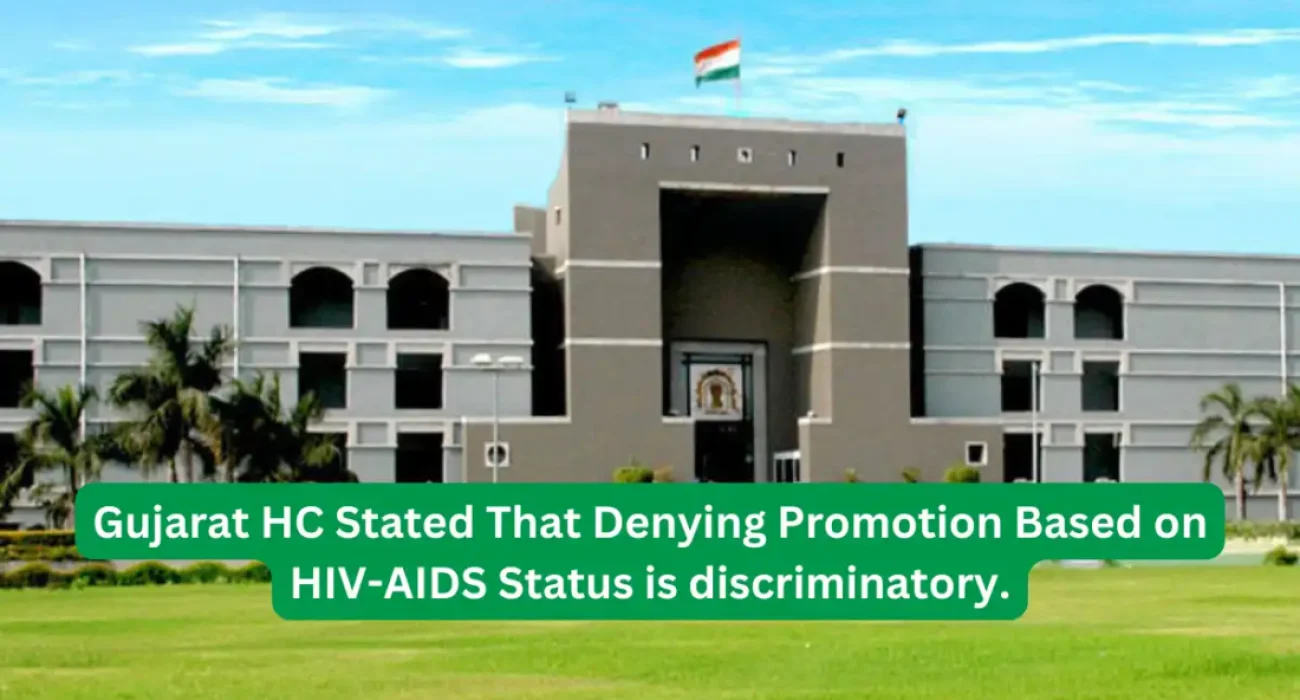

Table of Contents
ToggleThe case before the Gujarat High Court revolves around a woman who alleges that her promotion within the Central Reserve Police Force (CRPF) was denied on the grounds of her health condition, specifically her HIV-AIDS status, despite meeting all other eligibility criteria. The petitioner challenges the validity of the CRPF’s recruitment rules, arguing that they are discriminatory and in violation of constitutional provisions. She claims that her promotion was withheld after a medical board declared her to be suffering from a higher grade of HIV-AIDS in February 2024. The woman contends that the refusal of promotion, solely based on her health condition, is unjust and contradicts the principles laid out under the HIV and AIDS (Prevention and Control) Act, 2017.
The petitioner’s counsel argued that the CRPF’s decision to deny her promotion was discriminatory and violated her fundamental rights under Articles 14 (Right to Equality), 16 (Equality of Opportunity), and 21 (Right to Life and Personal Liberty) of the Indian Constitution. The counsel pointed out that, aside from her health condition, the petitioner was otherwise fully eligible for the promotion. The denial of her advancement, based solely on her diagnosis of HIV-AIDS, was unjust, especially given that it was a ministerial post, which is not physically strenuous. Furthermore, the petitioner contended that the CRPF’s rules, particularly the Standing Order Number 4/2008 and the 2011 Recruitment Rules, were incompatible with the HIV-AIDS Act and other national guidelines, creating an unfair barrier for individuals with HIV-AIDS seeking promotion within the force.
The counsel for the respondents, representing the Union of India, defended the decision by citing the CRPF’s recruitment rules, which include a health standard stipulating that candidates must be in “Shape One” to be eligible for promotion. The respondents argued that this health requirement, which also applies to the petitioner, was a legitimate factor in the promotion process. The counsel further stated that the CRPF has previously considered health conditions as part of its promotion decisions. However, they contended that this was not a case of outright exclusion but rather a measure to ensure that individuals were physically fit for the role.
The Gujarat High Court, during its oral observations, made strong remarks about the apparent discrimination in the CRPF’s approach to promotions for individuals suffering from HIV-AIDS. The court questioned the logic behind denying promotions for ministerial posts based on health conditions, particularly HIV-AIDS, noting that such posts do not involve fieldwork or strenuous physical activity. The court emphasized that unless an individual is incapable of discharging their duties due to health reasons, denying promotion based on an ailment whether HIV-AIDS or any other disease was discriminatory. The court also highlighted the unreasonableness of creating health-related categories to exclude individuals from advancement, particularly when such diseases do not impair an individual’s ability to perform non-field tasks.
The court further pointed out that the discrimination was more egregious given that similar health conditions, like heart disease or diabetes, are not subjected to the same discriminatory treatment in terms of promotion eligibility.
The Gujarat High Court concluded that the denial of promotion based solely on the petitioner’s HIV-AIDS status constituted clear discrimination. The court questioned the constitutional validity of the CRPF’s recruitment rules, specifically the provisions that limit promotions based on health conditions. The court asked the counsel for the respondents to provide a logical and constitutional justification for the discriminatory rules. The court made it clear that if the respondents could not present a valid reason for such discrimination, the rules would likely be struck down as unconstitutional.
The court directed that the matter be brought to the attention of the Additional Solicitor General of India for further consideration and set the next hearing date for March 6, 2025. The court allowed the respondents to file their response and stated that this case presented a significant constitutional issue that would be decided expeditiously.
Credits: Deeksha Rai
IAW resources
Browse our help directory